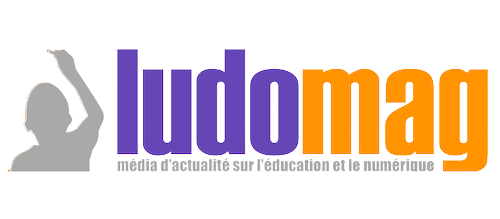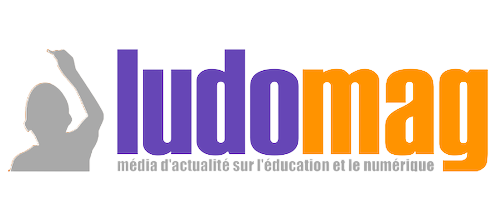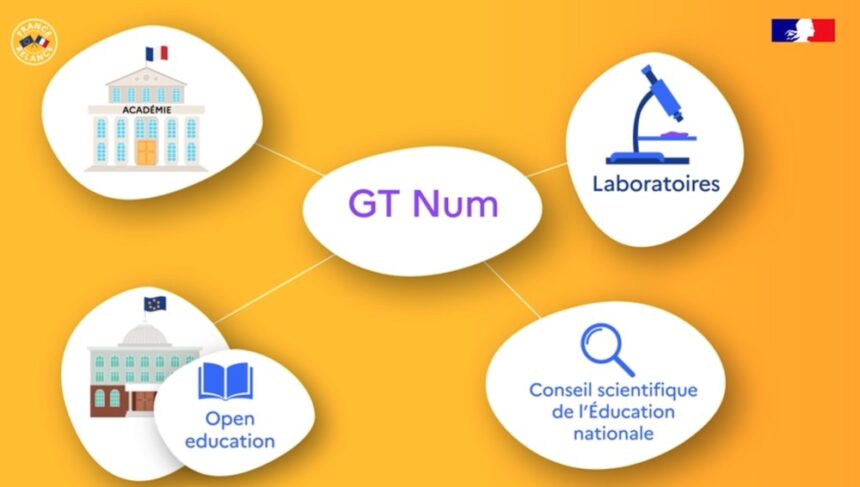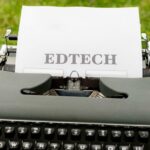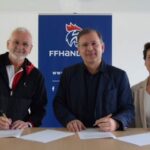Elie Allouche has been a project manager responsible for applied research since 2016 at the Directorate for Digital Education. Today, he presents the digital thematic groups, called GTnum, which produce knowledge in open access on the digital transformation of education.
Do you have questions on any topic related to this transformation? You will certainly find answers in the publications and portfolios produced over the past seven years, so don’t hesitate to consult them! It’s open, it’s free, and there are even multiple reading formats available, from quick summaries to more in-depth analyses. In the rest of the article, we provide all the useful links 🙂
When Research Collaborates with the National Education within the Academies
Elie Allouche manages partnerships with research, but not in a centralized manner; his role is primarily to support academies in conducting actions with research, « enabling academic territories to develop partnerships with research; supporting innovation and digital transformation in education and training, while producing knowledge. » he emphasizes.
The latter action is the most important for analyzing what research says in education; how it helps us understand what is happening, providing keys to understanding and levers for action.
This knowledge production involves not only researchers but also practitioners.
« Producing knowledge is both the work of scientific research proper and the perspective of practitioners on these transformations. » he explains.
This work is federated through the Digital Thematic Groups or « GTnum, » « which are participatory research groups that involve both researchers and education practitioners. »
The role of the DNE is to support these GTnum by financing each of them with €75,000 over three years.
« This allows laboratories to fund doctoral students, postdoctoral researchers, and research engineers, for example. » he points out.
The evolution of these working groups « requires us to monitor emerging themes every year » he explains.
Here are the themes that have already been addressed over the past seven years:
Themes 2017-2020
- Digital immersion and virtuality
- Youth uses
- Learning traces/Learning analytics
- Appropriation by teachers
- Resources
- Blockchain
Themes 2020-2022
- Artificial intelligence and education
- Digital humanities
- Hybridization of teaching
- Digital and disparities
Themes 2021-2024
- Data literacy
- Learning through play
- Evaluating a digital device in education within the framework of an inclusive school
Themes 2022-2025
- Educational digital territories (TNE)
- Digital sobriety
- 21st-century skills
- Training, certification
Every year, a call for projects, nicknamed « call for expressions of interest, » is launched in which about ten themes are proposed. From there, the universities supervising the laboratories contact the academic territories before sending their file to the selection committee.
« The selection committee includes both the DNE, the DGESCO, the Inspectorate General, the Scientific Council of National Education, and sometimes experts who are mobilized for certain files. » he describes.
At the end of this selection process, 4 Digital Thematic Groups are chosen for a period of three years.
Participatory Research and Open Science: Two Essential Components for GTnum
Throughout the three years, GTnum produces knowledge that is available, open, and free on the research notebook « Education, Digital, and Research, » hosted on the open science platform Hypothèses.
Beyond « milestones » GTnum also produces webinars, training materials, which are particularly useful in academic or national training plans.
Our two main methodological axes are participatory research and open science.
Participatory research means it is conducted openly between researchers and education stakeholders (teachers, trainers, inspectors, etc.).
Open science is a crucial point in the specifications, meaning that all productions and publications from these groups must be openly accessible.
« This point is important because we know very well that one of the main obstacles to the dissemination of scientific work, especially to teachers, is access. » emphasizes Elie Allouche.
At the end of the three years, GTnum publishes their « portfolio » « which brings together all of their publications and ideally the research data associated with them, via the DMP – Data Management Plan, which allows for supporting documentation of the data they relied on to publish their work. » he adds.
The editorial processing of portfolios is ensured by Réseau Canopé. They are therefore available on the eduscol website, but also on the agency’s website for Reseau Canope’s usages and finally on academy websites; portfolios may also be distributed on other operators’ sites such as the French Institute of Education and of course on laboratory sites that will promote their work.
We multiply dissemination channels so that this work can have the widest possible impact.
Today, the most recent wave of GTnum is arriving, and it addresses three themes:
- Generative Artificial Intelligence will be addressed by two groups, « because we also find it interesting to see how the same theme will be addressed by different laboratories to have a plurality of viewpoints. »
- Media and Information Literacy linked to digital citizenship.
- Digital commons, which are the production of open and shared resources by practitioner communities.
We are both financial and methodological support for GTnum, also to facilitate networking. There are also moments of « real » meetings, for example, during the IN FINE symposium or the Educatech Expo.
« But the organic link is indeed the link between laboratories and academies » he adds.
Elie Allouche invites us to consult the portfolios and publications, which are at different levels of reading: in-depth reading, shorter reading with the monitoring bulletins produced by Reseau Canope, which also include visuals and infographics to facilitate synthesis, etc.
Finally, he acknowledges that it is not always easy to get researchers and education practitioners to work together; they need to find a common object. For example, during the lockdown period, the common object was obvious: hybridization!
« Researchers and teachers then had the same urgency: forced distance, separation, tinkering, or inventing new solutions, … ».
« The challenge for GTnum is also to invent meeting grounds between cultures that are not the same, and we do not overlook the obstacles. » concludes Elie Allouche.
